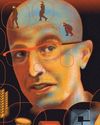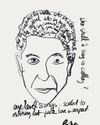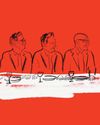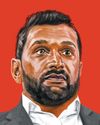
Never marry again in slavery. - Margaret Garner, 1858
Wherever the law is, crime can be found. - Aleksander Solzhenitsyn, 1973
I.
"Lower-class behavior in our cities is shaking them apart.” By his own lights, Daniel Patrick Moynihan, ambassador, senator, sociologist, and itinerant American intellectual, was the product of a broken home and a pathological family. He was born in 1927 in Tulsa, Oklahoma, but raised mostly in New York City. When Moynihan was 10 years old, his father, John, left the family, plunging it into poverty. Moynihan’s mother, Margaret, remarried, had another child, divorced, moved to Indiana to stay with relatives, then returned to New York, where she worked as a nurse. Moynihan’s childhood—a tangle of poverty, remarriage, relocation, and single motherhood—contrasted starkly with the idyllic American family life he would later extol. “My relations are obviously those of divided allegiance,” Moynihan wrote in a diary he kept during the 1950s. “Apparently I loved the old man very much yet had to take sides … choosing mom in spite of loving pop.” In the same journal, Moynihan, subjecting himself to the sort of analysis to which he would soon subject others, wrote, “Both my mother and father—They let me down badly … I find through the years this enormous emotional attachment to Father substitutes—of whom the least rejection was cause for untold agonies—the only answer is that I have repressed my feelings towards dad.”
This story is from the {{IssueName}} edition of {{MagazineName}}.
Start your 7-day Magzter GOLD free trial to access thousands of curated premium stories, and 9,000+ magazines and newspapers.
Already a subscriber ? Sign In
This story is from the {{IssueName}} edition of {{MagazineName}}.
Start your 7-day Magzter GOLD free trial to access thousands of curated premium stories, and 9,000+ magazines and newspapers.
Already a subscriber? Sign In

A Brief History of Yuval Noah Harari - How the scholar became Silicon Valley's favorite guru
"About 14 billion years ago, matter, energy, time and space came into being." So begins Sapiens: A Brief History of Humankind (2011), by the Israeli historian Yuval Noah Harari, and so began one of the 21st century's most astonishing academic careers. Sapiens has sold more than 25 million copies in various languages. Since then, Harari has published several other books, which have also sold millions. He now employs some 15 people to organize his affairs and promote his ideas.

Boat Fish Don't Count
The wild, obsessive, dangerous pursuit of Montauk's biggest striped bass

The Anti-Rock Star
Leonard Cohen's battle against shameless male egoism

Rachel Kushner's Surprising Swerve
She and her narrators have always relied on swagger-but not this time.

Men on Trips Eating Food
Why TV is full of late-career Hollywood guys at restaurants

You Think You're So Heterodox
Joe Rogan has turned Austin into a haven for manosphere influencers, just-asking-questions tech bros, and other \"free thinkers\" who happen to all think alike.

What Abortion Bans Do to Doctors
In Idaho and other states, draconian laws are forcing physicians to ignore their training and put patients' lives at risk.

THE LOYALIST KASH PATEL WILL DO EXACTLY WHAT TRUMP WANTS.
A 40-year-old lawyer with little government experience, he joined the administration in 2019 and rose rapidly. Each new title set off new alarms.

THE RADICAL CONVERSION OF MIKE LEE
IN 2016, HE TRIED TO STOP TRUMP FROM BECOMING PRESIDENT. BY 2020, HE WAS TRYING TO HELP TRUMP OVERTURN THE ELECTION. NOW HE COULD BECOME TRUMP'S ATTORNEY GENERAL.

HYPOCRISY, SPINELESSNESS, AND THE TRIUMPH OF DONALD TRUMP
He said Republican politicians would be easy to break. He was right.